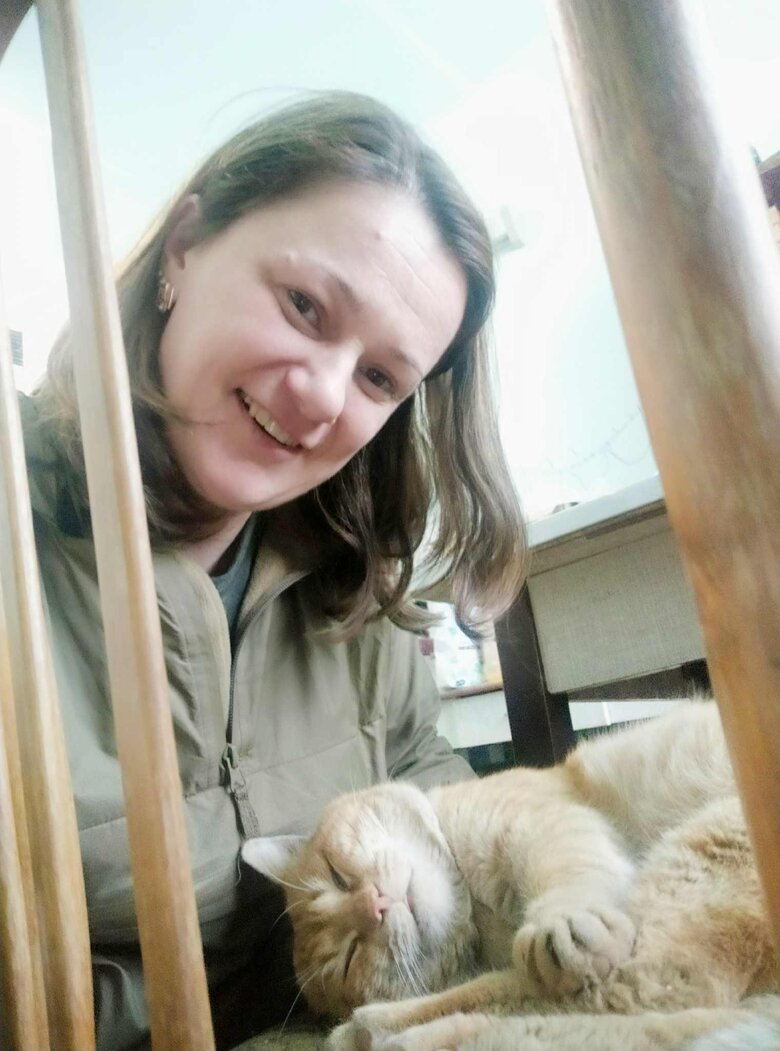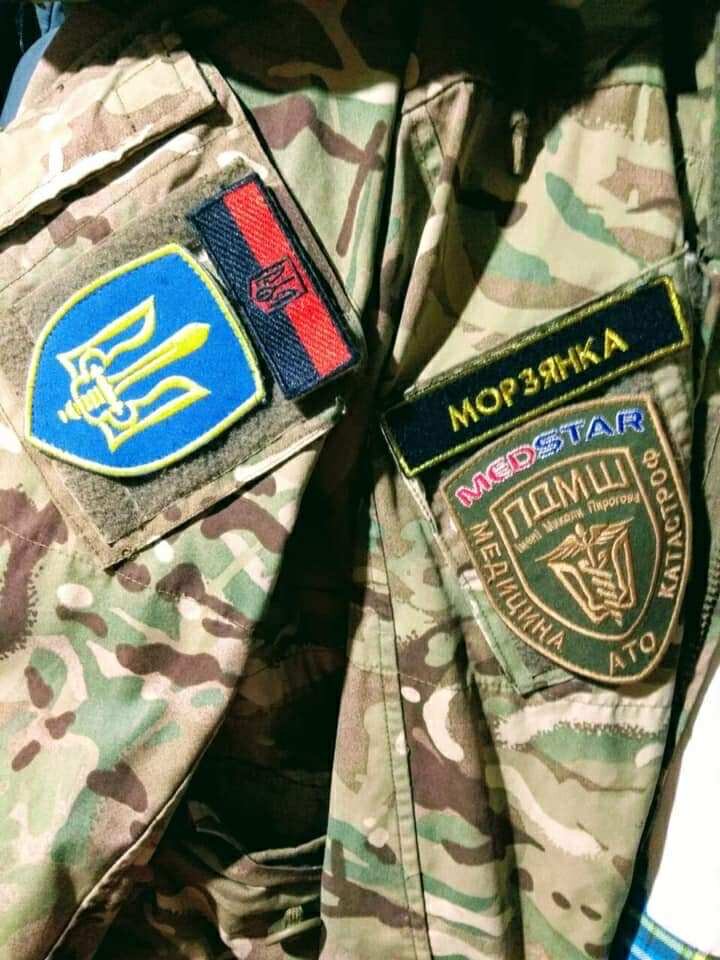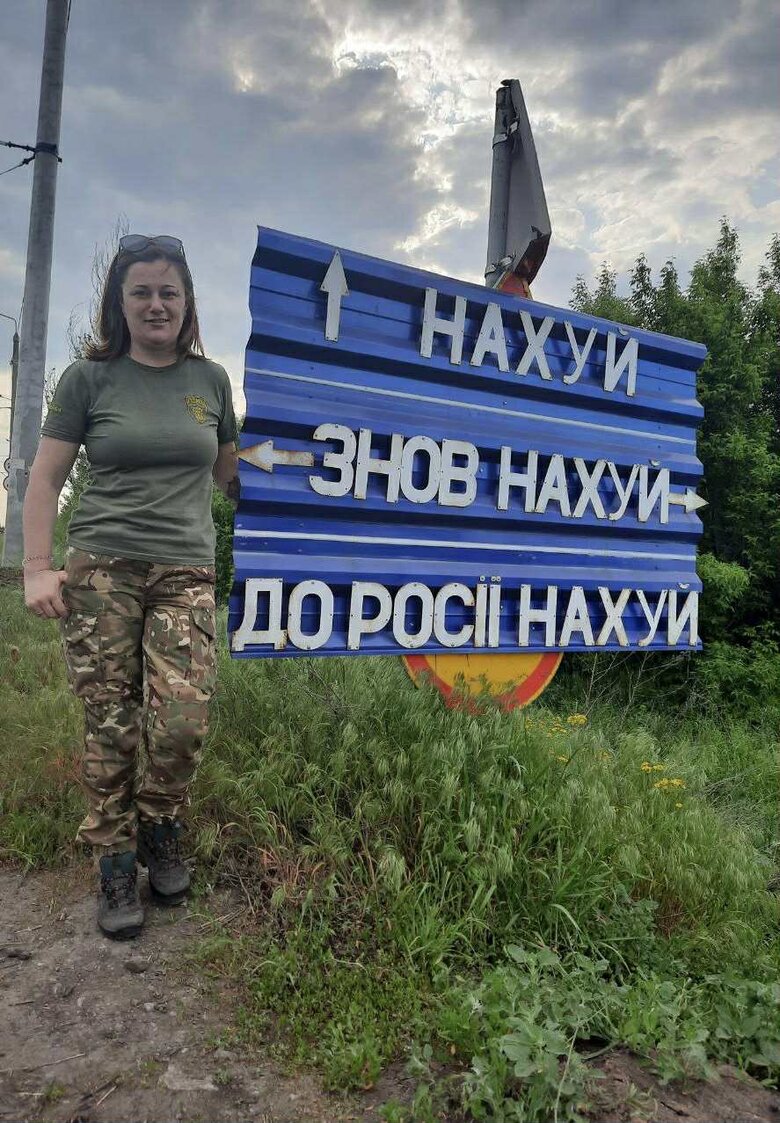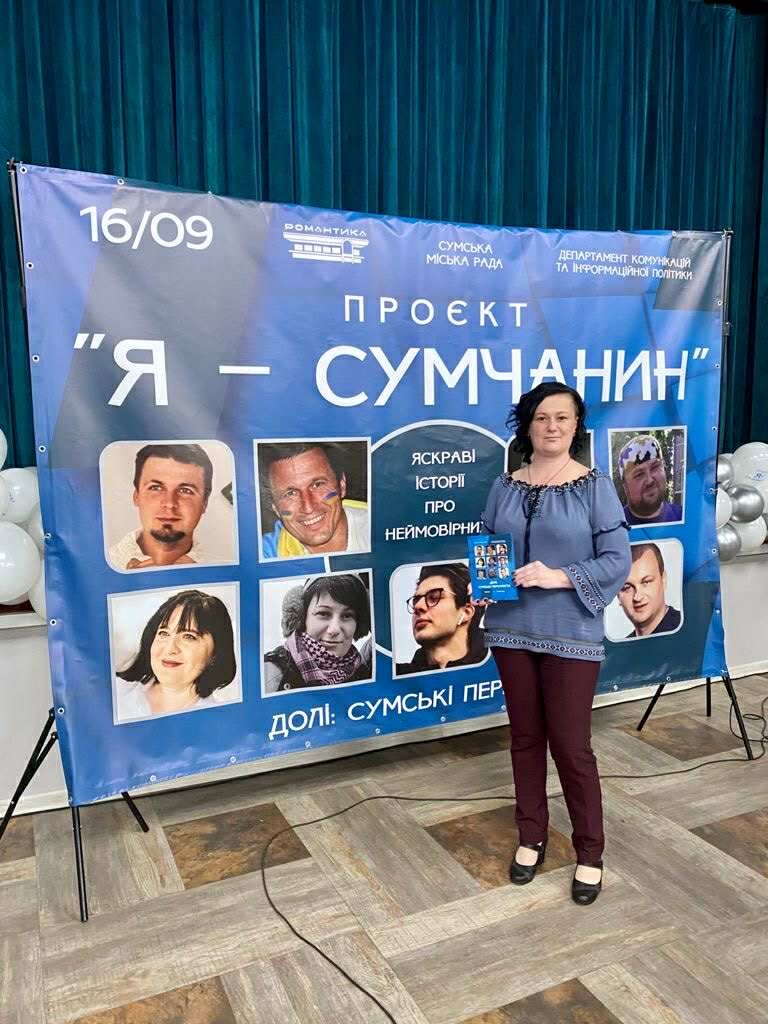"Back then, there were more mine-blast wounds. Now, no matter what you ask guys, they say: drone flew in, drone, drone..." - war veteran, anaesthesiologist at Sumy Central City Hospital, Maryna Bilinska
About life in the Sumy region today; about how people here live in the midst of death. Also, how doctors operate on wounded soldiers, and why Sumy, unfortunately, still has a lot of ordinary people from the series "What’s the Difference"...
...She was given the call sign Morzianka in 2015 near Popasna. Why Morzianka? Maryna Bilinska explains it this way:
"I have severe logoneurosis, so I have to build my life differently from other normal people. And I got my call sign like this: we were helping one of the brigades at the time; we came to get acquainted in an ambulance. And one of the commanders invited us for coffee and tea. And so we talked: who, what, how. He was listening to me, and then he said: "You are talking so funny...
I thought to myself: should I be offended or is it really so funny? And he explains: you speak like Morse code. Oh, he says, you're going to be a Morzianka!
That's how it stuck with me back in 2015..."
Today, Maryna is an anaesthetist at Sumy Central City Hospital. She is one of those people who are the backbone of any business. Responsible, conscientious, sincere. She calls white white, black black. In our conversation with her, she repeatedly expressed unpopular opinions. That is, the truth that few people speak out loud...
What is this interview about? About life today in the Sumy region; about how people live here in the midst of death. And also, how doctors operate on wounded soldiers, and why, unfortunately, there are still a lot of ordinary people in Sumy from the "What's the Difference" series...
- Maryna, how does the work of an anaesthetist in a city and de facto frontline hospital differ from similar work in the rear area?
- Of course, it is very different, because we started receiving wounded - military and civilians. Whether orthopedists, surgeons or anaesthetists, almost none of us had ever seen such injuries.
- Was it difficult to retrain? Or were the difficulties more of an emotional nature?
- Yes, it was more emotional. Nurse girls cry, they feel sorry for everyone. That is normal. Sometimes I cry - for example, when a 23-year-old boy was brought from the Kursk direction. His leg had been completely torn off, and his foot was hanging on the skin. They had to amputate it. Everyone was crying.
- The men may not have cried, but...
- ...But you could see in their eyes that it was hard for them. And if they could, they would have cried with us...
But they adjusted very quickly. The guys did not hide the fact that they started reading books and watching videos about combat trauma. As a result, there were just a couple of times when someone got lost somewhere. And then everything went smoothly, as if they had been doing this all their lives. It was not difficult for me personally in terms of work, because I was in Bakhmut in 2022 when it was bombed. I was also in Chasiv Yar when it was bombed. Then there was 2023, in Lyman, when the Serebrianskyi Forest was bombed. I was working at the stabilisation centre at the time. However, I was more involved in evacuating people from the stabilisation centre.
- Did you volunteer during the war?
- Yes, the Pirogov First Volunteer Hospital, a well-known volunteer organisation. I was there in 2022-2023.
Video essay about Morzianka by Serhii Lytvynchuk
I stopped travelling when the same bad situation started in Sumy. I decided that I was needed here.
- There were two periods before the "dvizhukha" in Sumy during this war. The first weeks of the war were a battle with the occupiers in the city and almost complete encirclement. Even though part of the region was under occupation. And then, when the Russians were driven back to their land, there was a period of calm for almost a year and a half. I used to visit Sumy during those months, and I remember seeing hundreds of people in the city centre during air raids. It was just a kind of resort promenade. People were walking around...
- And they are still walking around now.
- I wanted to say: have you gone mad, people? You should understand that with a distance to the Russian border of 22 to 60 km, there is so little time for ballistic missile to fly that the alarm often doesn't have time to be activated.
- This has happened. But it wasn't the fact that people were walking that struck me more.
- And what?
- You see, when everyone fled abroad at the beginning of the aggression and took their children with them, Sumy was almost empty. And when everyone returned, I was struck by the fact that all the playgrounds were packed with children speaking the fucking Muscovite language. Mothers, I won't call them anything else, speak to their children in the Moskal language. Young people aged 13-15 listen exclusively to Muscovite stupid rap or whatever it's called in their speakers. This amazed me and never ceases to amaze me.
- Is there still a lot of this in the city?
- It never stopped. Every day we are hit by shaheds, rockets, and they listen to Russian songs, watch Russian TV shows, and speak the Moskal language. This makes me depressed, even... I feel very uncomfortable among such people. I stopped going out. I don't go to establishments. I don't go anywhere. I try not to even go to big stores, because it triggers me a lot. My husband is at war. What is he fighting for? For the Muscovite language?
- In the Sumy region, the situation has been gradually changing for the worse since the autumn of '23. But the Kursk operation in 2024 was the point of no return?
- Yes, it was. Of course, I am not an expert. But I consider the Kursk operation to be an absolutely senseless failure. I think so.
- How often are the wounded from the border villages and towns of Sumy region brought to your hospital?
- Every shift. Now, these days, we are dealing with the military a little less, because military doctors have arrived. They are helping us, dealing with the military. And while they were away, we were not sitting down 24/7, because they were transporting, transporting, transporting, transporting from the front.
- What kind of injuries dominated?
- A lot of shrapnel wounds. A lot of trouble from these "butterflies" - petal mines. There are a lot of severed lower limbs and mangled hands. And, unfortunately, there are too many turnstile syndromes.
- What is it exactly?
- This is when you remove the turnstile and there is a tiny wound. The turnstile didn't need to be put on, but it was there for 8 or 10 hours. And you have to amputate the limb. It's terrible.
- So sometimes the guys don't understand when, how and for how long to apply a tourniquet?
- Perhaps they do. But there are also no developed approaches, withdrawals - that is, no normal evacuation. Even in that terrible period, as it seemed to me at the time, the Bakhmut period, we had a road that we could use to get to the stabilisation point. Yes, it was also shelled, but not so densely. We could easily get there, pick up an extremely seriously wounded person and go with him to Kram or Slavik.
But here, there are no such evacuation routes. The guys themselves say that they walk for kilometres. They crawl, walk, climb - I don't know how they get there. Because no one picks them up. Sometimes they are left to their fate. We can say it's because of the heavy shelling. Or maybe not. I don't know...
- Has the number of "drone" injuries increased?
- I can't say that it's a lot, but yes, it has increased. Back then, there were more mine-blast wounds. And now, no matter what you ask the guys, they say: a drone flew in, a drone flew in, a drone, a drone...
- Do the Russians hunt our evacuation vehicles a lot?
- Yes, they do. It's been going on since '14. And, of course, it doesn't stop. Even in Sumy, when something arrives, and the SES arrives, ambulances arrive, they shoot at the same place again...
- It's their favourite trick. Tell us about the terrible day of 13 April this year, when two Iskanders were fired into the city centre. Where have you been at the time?
- At home in Sumy. I woke up just a short time ago. I was drinking coffee, getting ready - we had some plans. I heard the explosion and immediately thought: I'm going to get a call from work. And less than 15 minutes later... I, of course, got ready in a second and ran (and I live not far away, in 15 minutes).
- And what did you see when you got to the hospital?
- I opened the door to the reception area and it seemed to me that I was in an American film: someone was sitting, someone was lying down, there were gurneys, there was a wall covered in blood. Everyone was rustling and running around. I've seen this before, but at stabilisation points where there were only military personnel. And then it was predictable, we were always waiting for them to be brought in at any second. But here it was strange to see it.
- What should the logistics be like in such cases? They brought a huge number of people with injuries of varying severity. Someone must have taken responsibility, looked at them and decided whom to operate on first.
- We immediately split up. One anaesthetist stayed at the reception desk to sort the patients. There were also surgeons and an orthopedist. Everyone came. To be honest, there were too many of us. Because everyone was taken to the hospital. Even a tiny shrapnel wound on the arm or head - they brought them. And then, when the triage started, we operated on, I think, 6 or 7 people.
- Did you manage to save everyone?
- No, not all of them. We managed to bring one woman to the operating theatre and she died on the operating table. She had injuries incompatible with life. The rest of them, yes, were saved.
- Maryna, is it okay that we are discussing in this interview that the wounded, including the military, are being taken to the city hospital? Or do the Russians know about it anyway? I'm asking because some readers will later write in the comments: now that you've told us, the Muscovites will know everything...
- What are you talking about? They know about it before we do. When, for example, something arrives in a village, all the civilians are surprised: a simple, ordinary village - why did it arrive there? A week passes, a little more, and civilians find out that there was a warehouse there, and there were guys there, and there were a lot of them. That is, the Muscovites know about it first, before we do.
- So there are enough snitches?
- By the way, I can't say that Sumy is a pro-Russian city - of course not. It's not a pro-Russian city. It's a city of the "What's the Difference"" type. I mean, as long as it's not about me, as long as they don't touch me. They say that if they came here and hung those tricolours, so what? As long as we live in peace...
- Are there many of them?
- I can't say that there are many, but there are enough of them. Again, this is a trigger. Sometimes I want to scream, tear my hair out - which is almost completely grey anyway (smiles sadly - Y.K.).
- You have just been on holiday in a village in the Sumy region. Is this village in the direction of the border from Sumy?
- Yes, it's towards Bilopillia, Vorozhba, Mykolaivka.
- That is, the towns and villages that suffer from shelling. How is life there?
- It's loud. Why have I been in the village? Because my parents have not been there, they were away on business. I was doing the housework, and in the evening I went outside to feed the dog. I hear a shahed rattling and they start shooting, working out. I realise it's somewhere very close. I go out the gate to the garden and see that this installation is right in my garden!
- You said: Bilopillia, Vorozhba, Mykolaivka... I sometimes think about how much we have become more familiar with the geography of Ukraine "thanks" to this war.
- I can say this from the other side. It would seem that in my life I would have no reason to know all the villages and roads in Donbas, to visit Sloviansk, Kramatorsk, Konstas, Druzhke, Chasiv Yar. You would think, why would I need it? It's the same here. I bought a map of Sumy region. I took a compass. I went out to the balcony, put the compass on the map and looked at where the smoke was, which village it had hit...
- Wow!
- We've gone a little bit crazy. We are not healthy, this is not normal. It should be like this: if something is flying, you should go to the shelter. But we don't run for cover. We run to the balcony...
- Someone told me: it seems that recently Sumy has finally realised that there is danger. But on the other hand, I don't see any crowded bomb shelters...
- They have not understood anything. Not even a little bit... Yes, of course, it's everyone's business. But children, small children, are all here. No one is taking anyone out, no one is leaving. Everyone is playing. Just as I was leaving my house for an interview with you, a bomb landed 100 metres from my house. When I calmed down, I looked out of the balcony and saw children riding bicycles and scooters...
- How do you make citizens understand how to behave in the face of danger? It's strange that I, a journalist who values freedom, am talking about coercion, but at the same time...
- Some things really need to be done by force. When there is an alarm, yes, you should be forced to go down to the shelter. As they do, for example, in the "Manufaktura" shopping centre, at the ASC.
- On the other hand, the same missiles arrive so quickly that many people will not have time to run or even go down to the shelters (where they are available). What should we do then? Is it still the two-wall rule?
- Two walls - maybe. I know that many people with children go either to the bathroom or to the corridors... You see, I have no advice. To say "everyone evacuate" is also wrong...
- Do you understand those villagers who are under fire every day? Do they stubbornly refuse to evacuate?
- If, God forbid, this happened to me, I would probably behave the same way. I understand them. This is their life, their home, their goats, chickens, dogs, cats, cows. It may sound strange, but we have all gone a little bit crazy. Two months ago, my husband told me to pack an emergency bag. I stood in the middle of the apartment and thought: what should I pack? What should I pack?
I told him: if you hire me a lorry to load all my flowers, I'll leave. Because I'm standing there and I realise that I feel sorry for my beautiful flowers, which I love...
- And everyone in the villages has their own "flowers"...
- Yes, that's what I'm talking about: some people have goats, some people have flowers, and some people have potatoes.
- Did a lot of people leave your parents' village?
- No. So far, more or less. No. It's loud, but it's only come in once this whole time.
- Restaurants and cafes in Sumy are packed in the evenings - what is the reason for this? Do people want to have that feeling of normal life despite everything?
- I agree. Even though I don't go to such places, I understand that sometimes I would like to go to a cafe, sit with friends, drink alcohol, relax a little, talk, laugh. So I can't blame these people who go out and have a good time.
- Let's get back to your professional world. Which of the operations you had to conduct in Donbas and Sumy are memorable and stick in your mind?
- There is one that happened in Sumy. It really sticks with me. It was very emotional.
- Tell us about it.
- We brought a wounded soldier from the Kursk direction. He was brought in in a very, very, very, very, very serious condition. In a state of shock. Huge injuries to his limbs, especially his hands, and heavy bleeding. He is white as a sheet. I put him under anaesthesia and start the operation. But he is really in an extremely serious condition, and I understand that he may die now. All the drugs that support his blood pressure are used (because his blood pressure is not holding at all). I am giving him unrealistically large doses of mimetics. We drip blood, plasma. Drip, drip, drip...
- On the principle of "we will do everything we can".
- We always do this. It's not about principle, it's about protocol. Everything is done as it should and must be. And so I was worried about him. I didn't want him to die on our table! And I'm standing over him - and every second his blood pressure and pulse are measured, everything is measured. The guys found the cause of the bleeding, blocked it, and started suturing. Finally, all the medicines, large doses of blood and plasma start to work. And he starts to improve. His skin colour improves, his tachycardia disappears a little, his blood pressure rises. And I understand that he is stabilising step by step.
The guys are finishing up. I prolong the anaesthesia a little bit so that he doesn't wake up immediately from the pain. I transfer him to my ward, to the intensive care unit. He finally wakes up.
Some time passes. I come up to him, take his hand... I say: can you hear me? He looks at me and says: I know you.(Although he was in a state of shock). God was calling me up, I was flying, and you took my hand and said: I won't let you go....
- Wow, wow.
- I even had tears in my eyes. Then I had such emotions for three days!
- You didn't walk, you flew?
- I guess so. Those were incredible emotions. Of course, there are many lives saved. But what did he dream about? Although, of course, it was a hallucination, but he recognised me, he recognised my voice. It was incredible!
- What are your and your husband's expectations for the second half of the year and winter?
There are several options. The worst: the Russians will capture Sumy. The best: they will be pushed back. And the middle one, but also bad: they will get close enough to the city to be able to gradually level it to the ground.
- I really want to be wrong, but unfortunately, in this life - and this is not related to the war, it has always been the case - I am a very big pessimist... And the current picture is very similar to Bakhmut and Chasyk. We withdrew, and they came up and levelled it to the ground. We withdrew, and they levelled them to the ground.
I saw all this with my own eyes in 2023. Therefore, it is very difficult not to perceive the current situation as déjà vu. Yes, perhaps I am pessimistic. It's unlikely that the Katsaps will be able to come in here. For some reason, I don't consider this option (although this is solely my vision). But I think the option of a levelling to the ground is possible.
- Do you have any plans to leave?
- No, I don't. As long as the hospital is working, as long as I am needed here, I will not leave.
- You are a tough nut, Maryna.
- Thank you.
Yevhen Kuzmenko, "Censor.NET"
Photos, video: from the archive of Maryna Bilinska













